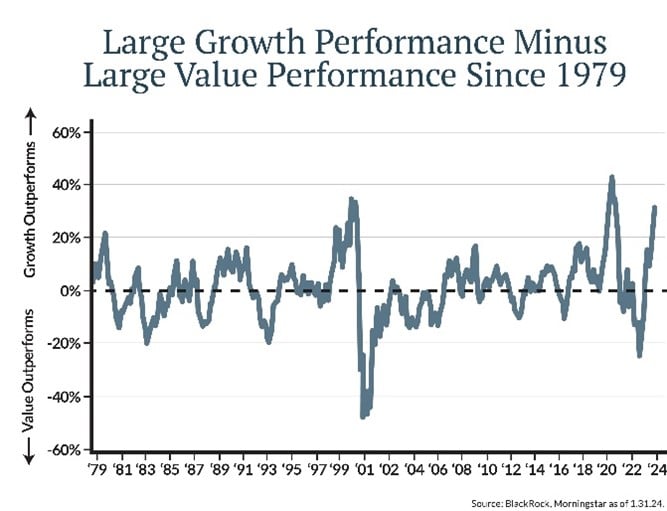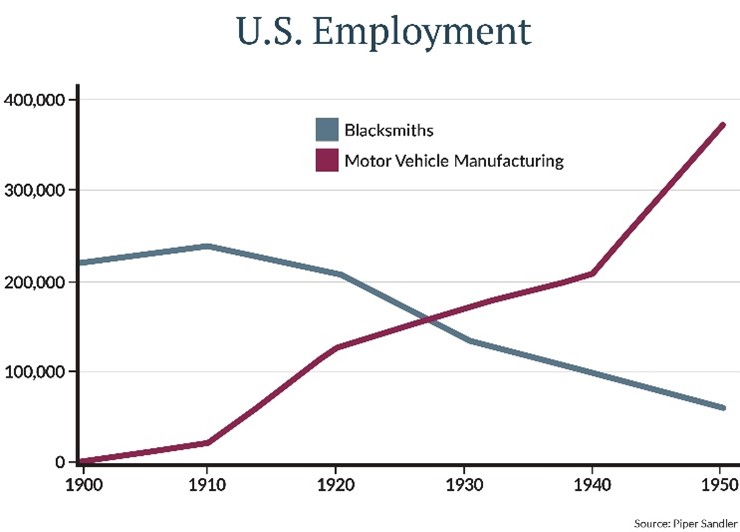
Kelsey Ellsworth
VP Wealth Portfolio Manager | Johnson Financial Group
As Vice President, Wealth Portfolio Manager, Kelsey works with clients to achieve their unique goals and objectives.
Investment Commentary
4 minute read time
Last week, I had the privilege of attending a talk by futurist Anat Baron about challenges and opportunities technology will present in the future. Her presentation not only excited me about what lies ahead but opened my eyes to many amazing tools already out there today.
Of course, by now everyone is familiar with ChatGPT, a generative artificial intelligence service from the company OpenAI. That same company is now launching Sora, a generative AI text-to-video generator. By giving the tool specific text prompts, the user can generate a minute-long video of just about anything they can imagine. In fact, a couple of weeks ago, Tyler Perry paused his $800 million production studio expansion after seeing what is in store from a video production standpoint.
While the capabilities we are just discovering can be startling—and certainly have created media and stock-market buzz—traditional artificial intelligence has been around since the 1950s. While we believe that over the long term digital disruption and artificial intelligence will be a structural change to the economy, we see pockets within financial markets that are riding on short-term hopes of near-term results.
Let’s take a look at some of those pockets with an objective of establishing a balanced market perspective.
In Dominic’s commentary last week, he emphasized the AI “narrative” as a driving force in markets over the past year. We can see this play out specifically on the growth side of the stock market, where companies like Microsoft, Nvidia and Alphabet make up a significant portion of the index.
The chart below shows Large Growth performance (measured by the Russell 1000 Growth index) versus Large Value performance (measured by the Russell 1000 Value index). Note the large swings between growth and value over the last couple of years, with growth outperformance surging over the past year (keep in mind, ChatGPT was released in late 2022).
 It is obvious that companies directly involved in AI development have benefited, but it’s important to recognize the impact of AI will extend well beyond the tech industry over the long term.
It is obvious that companies directly involved in AI development have benefited, but it’s important to recognize the impact of AI will extend well beyond the tech industry over the long term.
Still, at this point, U.S. growth-stock valuations are above average, and we believe now is a time to review portfolios for opportunities to rebalance. Our overall approach is to remain balanced between growth and value segments of the market and focus on quality-oriented stocks that are less sensitive to economic cyclicality.
On a go-forward basis, taking some profits in stocks to redeploy in to bonds is also attractive as investment-grade bonds are expected to earn about 5% over the next 10-15 years based on current yields. This compares to an expected average return of 7% for stocks.
Innovation certainly is key to increasing productivity and profit margins for companies. However, research from Piper Sandler suggests that capital spending leads productivity by three years, suggesting an actual acceleration of productivity growth can still be years away.
Moreover, AI-related tech capex accounts for just 7% of all capex spending and only 1% of GDP. As mentioned in last week’s commentary, the AI boom has reminded some of the dot.com bubble in the late ‘90s … while others say “it’s different this time.” Like most things, the truth probably lies somewhere in the middle.
What about jobs? Here’s some food for thought. An IBM study from August 2023 estimates that 40% of the workforce will need to reskill as a result of implementing automation over the next three years. This may sound scary, but society has been here many times before. The fear that tech-related employment will eliminate jobs is misplaced. The following chart from our research partner, Piper Sandler, helps to put this into perspective and supports the notion that creative destruction actually builds jobs in the long term.

While its easy to get wrapped up in the hype and excitement surrounding all things “AI”, this is a time where investors need to be cautious. Investing takes courage and brains with varying degrees of each at different times. While we cannot control what the future holds, we can control proper asset allocation and maintaining a disciplined financial plan…and just maybe your plan incorporates the purchase of a flying car.
Though we can’t know when that futuristic tech will become a reality, we certainly can help build a roadmap that incorporates your dreams of being an early adopter of flying cars.
This information is for educational and illustrative purposes only and should not be used or construed as financial advice, an offer to sell, a solicitation, an offer to buy or a recommendation for any security. Opinions expressed herein are as of the date of this report and do not necessarily represent the views of Johnson Financial Group and/or its affiliates. Johnson Financial Group and/or its affiliates may issue reports or have opinions that are inconsistent with this report. Johnson Financial Group and/or its affiliates do not warrant the accuracy or completeness of information contained herein. Such information is subject to change without notice and is not intended to influence your investment decisions. Johnson Financial Group and/or its affiliates do not provide legal or tax advice to clients. You should review your particular circumstances with your independent legal and tax advisors. Whether any planned tax result is realized by you depends on the specific facts of your own situation at the time your taxes are prepared. Past performance is no guarantee of future results. All performance data, while deemed obtained from reliable sources, are not guaranteed for accuracy. Not for use as a primary basis of investment decisions. Not to be construed to meet the needs of any particular investor. Asset allocation and diversification do not assure or guarantee better performance and cannot eliminate the risk of investment losses. Certain investments, like real estate, equity investments and fixed income securities, carry a certain degree of risk and may not be suitable for all investors. An investor could lose all or a substantial amount of his or her investment. Johnson Financial Group is the parent company of Johnson Bank and Johnson Wealth Inc. NOT FDIC INSURED * NO BANK GUARANTEE * MAY LOSE VALUE